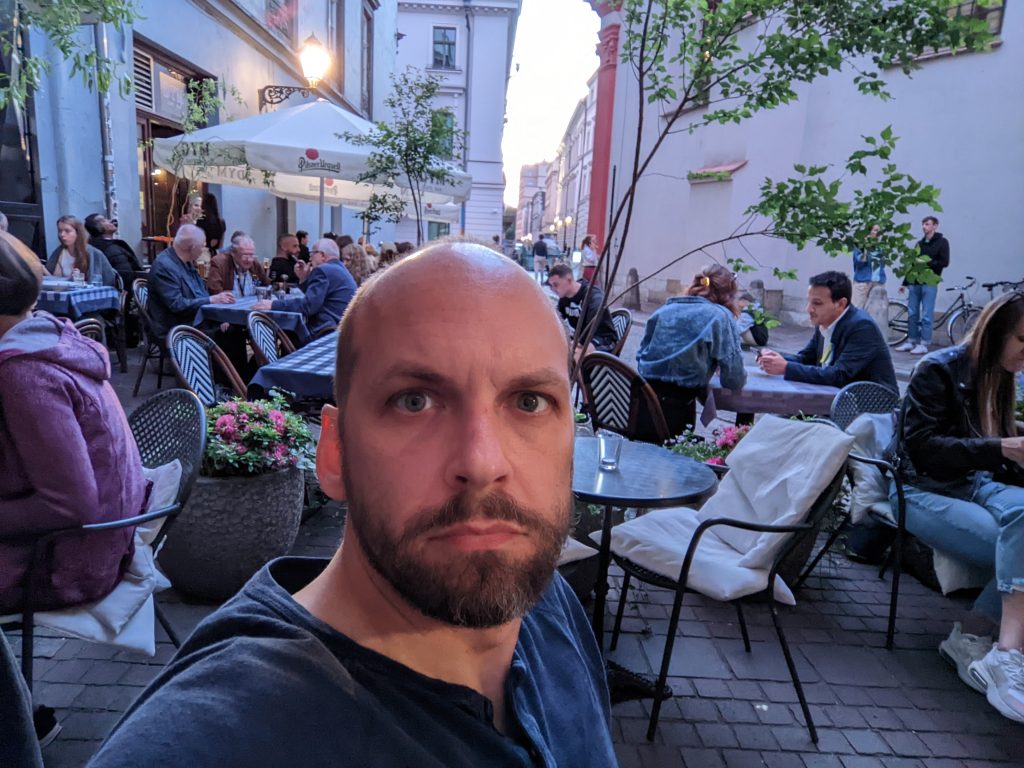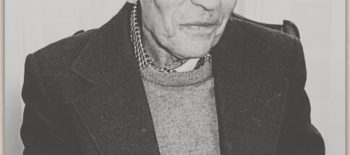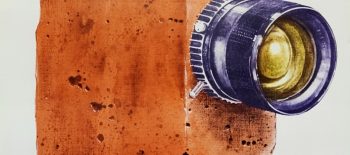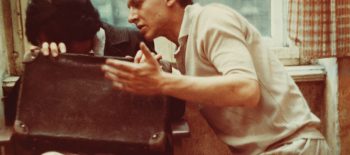S3E3 and all video recordings are available at:
Polish Cultural Institute New York YouTube
Encounters with Polish Literature is a video series for anyone interested in literature and the culture of books and reading. Each month, host David A. Goldfarb will present a new topic in conversation with an expert on that author or book or movement in Polish literature. More about the Encounters with Polish Literature series and the timeline.
Leopold Tyrmand (1920-85), author of one of the great novels of Warsaw and popularizer of jazz in mid-twentieth-century Poland was a transformative figure in Polish culture between the death of Joseph Stalin and the post-Stalin thaw.
Before the war, Tyrmand studied architecture in Paris, collecting jazz records that would become the basis of the Polish Jazz Club that he established at the YMCA in Warsaw, where he lived for a time. When the war broke out he fled to Vilnius, writing for the local Polish-language edition of Komsomolskaya Pravda (Prawda Komsomolska), until he was questioned and sentenced for associating with underground Polish circles. It was Czesław Miłosz’s brother, Andrzej, who discouraged him from getting too deeply involved with the organ of Soviet youth. Tyrmand managed to escape the 8 year sentence in the chaos of the German invasion, working on false papers in Germany, ending up in 1944 on a ship bound for Norway, and landing in a concentration camp in Oslo where he survived the war. His semi-autobiographical novel Filip, inspired by his working as a waiter in Nazi Germany, concealing his Jewish identity, is the basis for a new film of the same title released this year in Poland.
After the war he wrote for various publications in Warsaw, including the progressive youth-oriented journal, Przekrój (“Cross Section”). Tyrmand became more assertive in his writing, eventually becoming censored from a range of publications, Przekrój most notably, where he was assigned to sports at the end, as a topic about which he could maintain enthusiasm without drawing too much attention from the authorities. This became his downfall when in 1953, he challenged the fairness of the Soviet referees in a well-publicized Polish-Soviet boxing tournament. He landed at Tygodnik Powszechny, remained very close to feuilletonist Stefan Kisielewski (“Kisiel”) his whole life, but this publication was also taken over for several years after refusing to publish an obituary of Stalin in 1953. He corresponded frequently with poet Zbigniew Herbert, who lived on Wiejska Street near Czytelnik publishers and the YMCA.
Having no other outlet for his writing, he began writing his Diary 1954 for the desk drawer, describing his private views about communism, censorship, and sex, all held together with the account of his romance with a young girl. Commissioned to write a novel about hooligans and “bikiniarzy“—the individualistic alternative youth culture—in 1954 by the state publishing house, Czytelnik–a sign of the coming Thaw–he dropped the diary abruptly. Zły (”Evil”), his great Warsaw novel, was published in 1955, and was a huge success.
Having increasing trouble publishing during the cultural retrenchment of 1957 through the mid-1960s, following the post-Stalin thaw of 1954-56, Tyrmand obtained a passport in 1965, leaving by car, visited his mother in Israel, and then headed to America on an invitation from the U.S. State Department. He arrived in 1966, published five pieces in The New Yorker, and also in other leading publications. Americans seem to know him in a generic way as a dissident writer from “over there.” Zły had been published by Knopf in an abridged form as The Man with the White Eyes in 1959. Later books were published with major presses, a collection of essays called Notebooks of a Dilettante (Macmillan, 1970) and a work that in Polish is A Primer on Communist Civilization, retitled The Rosa Luxemburg Contraceptives Cooperative (Macmillan, 1972), of which Columbia acquired three copies.
His political turning point is “Permissiveness and Rectitude,” published in the February 28, 1970 issue of The New Yorker, a screed against the sexual revolution and the American counterculture. Tyrmand was consistent in being a contrarian. In Poland, he was a leader of an antiestablishment counterculture, and in New York in the late 1960s, he rebelled against the counterculture he found here. He didn’t like its aesthetics, the decline of the classical sense of line, the dissipation of formalist modernism, and the rise of the hippies and nudists. It’s not exactly that he had become prudish–but adopted a position that if everything is permitted, if there are no boundaries, then culture is impoverished.
Works by Tyrmand in English:
Diary, 1954. Tr. Anita Shelton and A.J. Wrobel. Evanston, Ill.: Northwestern University Press, 2014.
The Man with the White Eyes. Tr. David Welsh. New York: Knopf, 1959.
Notebooks of a Dilettante. New York: Macmillan, 1970.
The Rosa Luxemburg Contraceptives Cooperative: A Primer on Communist Civilization. New York: Macmillan, 1972.
Tyrmand essays in The New Yorker, 1967-70. (subscription or institutional/library access required).
Sopot Jazz Festivals, 1956 and 1957, organized by Tyrmand:
Jazz 56: I ogólnopolski festiwal muzyki jazzowej. Ed. Tomasz Tłuczkiewicz. Polskie Nagrania, 2006.
Jazz 57: II ogólnopolski festiwal muzyki jazzowej. Ed. Tomasz Tłuczkiewicz. Polskie Nagrania, 2007.
English-language article on the new film, Filip:
Dowell, Stuart. “The incredible true story behind new WWII blockbuster ‘Filip.’” The First News. 3 March 2023.

Benjamin Paloff is Professor of Slavic Languages and Literatures and of Comparative Literature at the University of Michigan, where he also directs the Center for Russian, East European, and Eurasian Studies (CREES) and is a faculty affiliate of the Frankel Center for Judaic Studies and the Copernicus Center for Polish Studies. His books include Lost in the Shadow of the Word (Space, Time, and Freedom in Interwar Eastern Europe) (Northwestern University Press, 2016), which was named the 2018 Best Book in Literary Studies by the American Association of Teachers of Slavic and East European Languages, and two poetry collections, And His Orchestra (2015) and The Politics (2011), both published by Carnegie Mellon University Press. His poems have appeared in a wide range of periodicals, including Boston Review, Conduit, New American Writing, The New Republic, The New York Review of Books, and The Paris Review. He has translated about a dozen books and many shorter literary and theoretical texts from Polish, Czech, Russian, and Yiddish, notably works by Dorota Masłowska, Marek Bieńczyk, Richard Weiner, and Yuri Lotman, and he has received grants and fellowships from the Michigan Society of Fellows (2007-2010), the Stanford Humanities Center (2013), and the National Endowment for the Arts (2009, 2016), among others.
Bartek Remisko, Executive Producer
David A. Goldfarb, Host & Producer
Natalia Iyudin, Producer
Lead image: Diary 1954, book cover.




